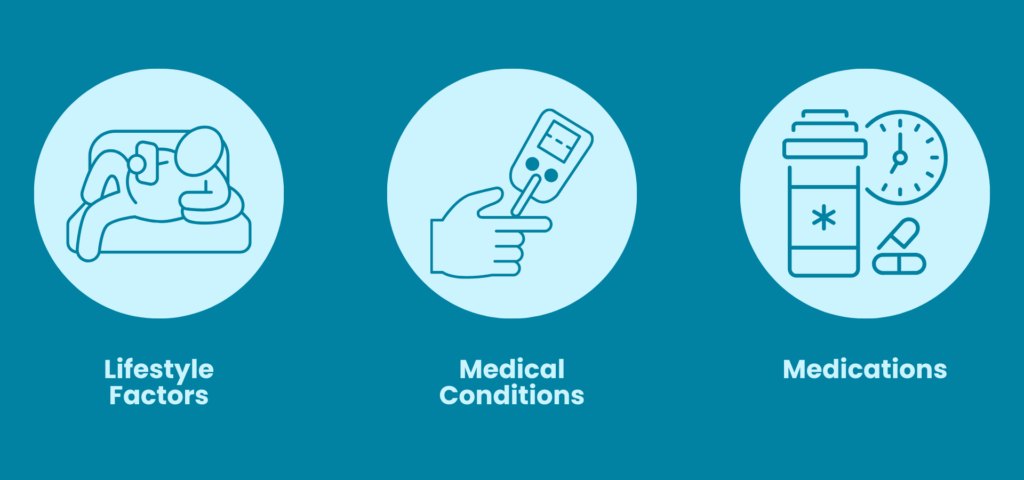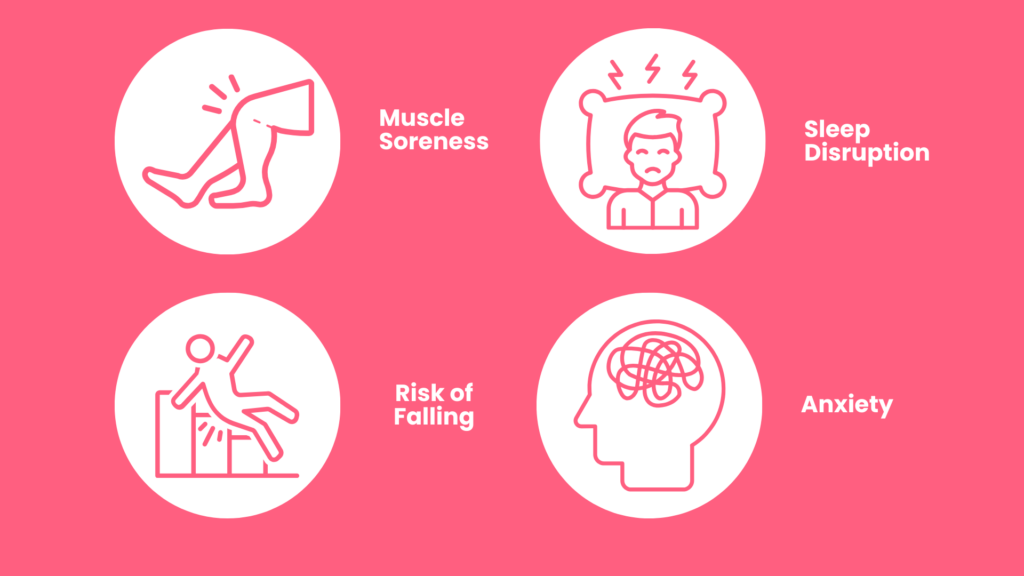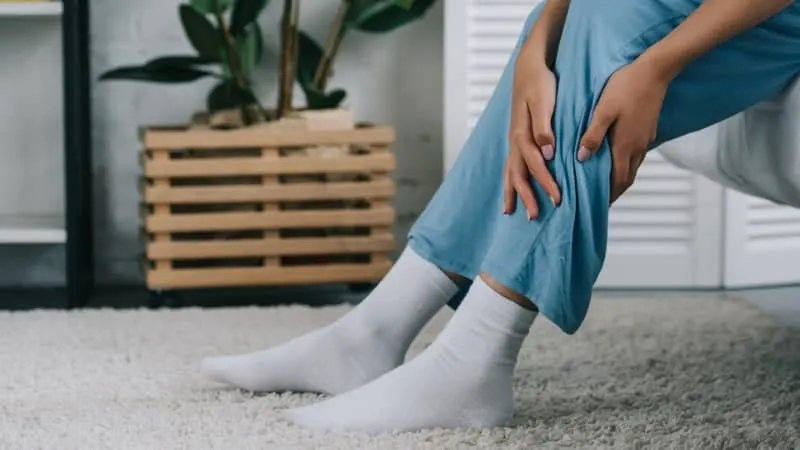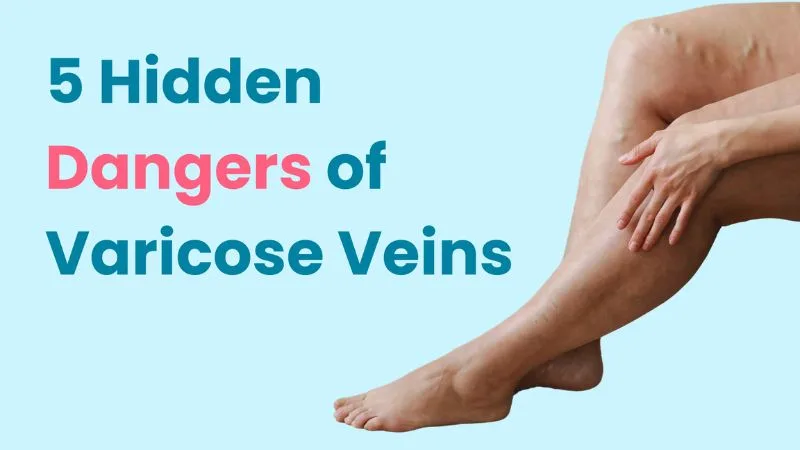Most people have experienced a muscle cramp at some point in their lives. Oftentimes they stem from exercise, dehydration, or premenstrual syndrome.
But one particularly bothersome type is nocturnal leg cramps.
This condition, sometimes referred to as rest cramps, affects millions of people. Up to 37% of the population experience nocturnal leg cramps(1).
Nocturnal leg cramps are an occasional occurrence for most. But for some people, these cramps can be debilitating, interrupting sleep and impacting quality of life.
Whether you suffer from occasional sleep disruption or something more frequent, there’s no need to worry. There are many different ways to tackle this condition head-on.
Let’s learn all about nocturnal leg cramps: their (many!) causes, related symptoms, prevention, and treatment.
Table of Contents
ToggleWhat Is A Leg Cramp?
A leg cramp is simply a muscle cramp: an involuntary contraction of one or more leg muscles.
Nocturnal leg cramps are a unique kind of cramp. As the muscle contracts, you’ll experience pain, or perhaps some itching or burning(1). They can happen in any part of the leg but are most often felt in your calves(3).
But cramps can happen at any time. Why do these special cramps occur at night?
What causes leg cramps?

There are quite a few different factors and conditions that can lead to leg cramps at night(4):
Dehydration. If you don’t drink enough water or electrolytes, you might experience leg cramps.
Muscle Fatigue. You might experience these cramps after strenuous exercise and overuse of your leg muscles.
Low activity level. In contrast, leg cramps can also occur when inactive or staying in one position for too long. This is why this often happens when you try to fall asleep.
Certain Medical Conditions. Conditions such as diabetes, neurological disorders, kidney disease, or venous insufficiency can lead to nocturnal leg cramps.
Age. Older patients, particularly seniors, are likelier to experience leg cramps(2).
Medications. These cramps can be a side effect of certain medications. Diuretics, statins, and certain asthma prescriptions can increase risk.
Pregnancy. Pregnancy leads to many big changes in the human body. This might include nocturnal leg cramps, particularly during later stages.
The Symptoms and Side Effects of Leg Cramps

Most of us have experienced cramps at one point. Often they are painful and uncomfortable moments that pass quickly.
However, experiencing leg cramps at night can lead to further complications:
Muscle soreness. After a leg cramp episode, the muscles can remain sore afterward. This can reduce mobility and interfere with daily activities like walking(5).
Falling. Sudden cramps might cause you to lose your balance and fall out of bed if you try to stand. This can lead to bruising, sprains, and fractures. This is more common for seniors(6).
Sleep disruption. Leg cramps can cause you to wake up several times at night, reducing sleep quality(7).
Anxiety. If regular leg cramps keep you awake, going to bed may seem stressful. You could have trouble relaxing and falling asleep.
Let’s expand on these last points: sleep disruption and anxiety, and how it compounds:
Sleep disruption is a major side effect that can lead to several problems. Getting through your workday while battling fatigue can result in a decrease in productivity. It becomes harder to complete tasks.
This can lead to more stress as work piles up and focus wanes. This can negatively affect mental health(8).
While leg cramps can be more than an uncomfortable moment, they could be a sign of a potential decline in quality of life.
Preventing Leg Cramps
Certain treatments and behaviors can help prevent leg cramps at night. Here’s how to reduce leg cramps without medical intervention(9).
Stay hydrated.
Drinking water is essential for the body to function. It can also reduce the risk of leg cramps. Make sure to drink electrolytes too, which we will elaborate on below.
Avoid caffeine and alcohol.
A little moderation goes a long way. Caffeine and alcohol dehydrate you, so keep cups of coffee and glasses of wine to a minimum. Avoid these completely before bed if you experience leg cramps at night.
Eat a balanced diet.
Add enough potassium, calcium, and magnesium to your diet to reduce muscle cramp risk.
Exercise regularly.
Regular exercise and stretching keep muscles flexible. However, avoid overdoing it, or you might make the problem worse!
Improve your bedtime situation.
Make your bedroom a sanctuary! Choose a comfortable mattress and supportive pillows, and avoid sleeping in cramped conditions.
Review your medications.
Medications like diuretics, statins, and certain asthma medications, may increase your risk. If you take these and suffer from debilitating leg cramps, talk to your doctor about your options(10).
If leg cramps regularly impact your sleep cycles, it might be time to talk treatment.
Leg Cramps Treatments
If leg cramps are causing undue stress and anxiety, it is time to talk to your doctor. There are several treatments they may try to reduce your leg cramps:
Medications
If you suspect your medications may be causing leg cramps, let your doctor know. They will review your prescriptions and may prescribe alternatives.
Addressing medical conditions
Leg cramps can stem from certain medical conditions like venous insufficiency(11). The decreased circulation, inflammation, and nerve compression can cause leg cramps.
Your doctor can recommend venous insufficiency treatments, like radiofrequency ablation, to tackle the problem head-on. This can reduce the condition’s side effects, including leg cramps.
Other conditions linked to an increased risk of leg cramps include diabetes or neurological disorders.
Compression Therapy

Doctors may recommend compression therapy for patients with venous insufficiency or poor circulation.
While there are still studies assessing their effectiveness(12), compression socks can improve symptoms of venous insufficiency, leading to reduced leg cramping(13).
Supplements
As we mentioned, electrolytes are important! A medical professional can perform blood tests to identify potassium or magnesium deficiencies. They may recommend over-the-counter supplements from your local pharmacy or health food store.
Stretching
A doctor or physical therapist may recommend regular stretching of specific leg muscles. This can improve flexibility and reduce leg cramps. A physical therapist can share safe and effective stretching techniques(14).
Stress reduction
It’s not only about the physical stress. Did you know that mental stress can exacerbate leg cramps? When you have trouble falling asleep due to cramps, this can cause even more stress. This new stress makes it even harder to fall asleep, forming a vicious cycle(7).
A doctor may recommend seeing a cognitive behavioral therapist to help manage anxiety. Your doctor or therapist can recommend relaxation exercises or meditation(15).
Conclusion
Nocturnal leg cramps can mean different things to different people – no two experiences with leg cramps for the same.
For one person, it might mean an annoying twinge of pain before falling asleep. For another, it might be debilitating, reducing sleep and productivity levels.
No matter how severe, you are now equipped with the knowledge of both at-home and medical treatment options that can improve your quality of life.
If you or a loved one suffer from leg cramps and find them disrupting everyday activities, help is out there. If you suspect that your leg cramps stem from vein disease, contact Elite Vein Clinic.
Our team is here to provide solutions for vein conditions of all kinds. We are professional and patient-focused, providing top-of-the-line care and modern treatments for those with vein conditions. Elite Vein Clinic has offices in Phoenix, Chandler, Gilbert, Mesa, Scottsdale, Tempe, and Peoria.
Ready to take control of your vein health? Book your free consultation today!
References
- Naylor JR, Young JB. A general population survey of rest cramps. Age Ageing. 1994 Sep;23(5):418-20. doi: 10.1093/ageing/23.5.418. PMID: 7825490.
- Abdulla AJ, Jones PW, Pearce VR. Leg cramps in the elderly: prevalence, drug and disease associations. Int J Clin Pract. 1999 Oct-Nov;53(7):494-6. PMID: 10692732.
- https://www.mayoclinic.org/diseases-conditions/muscle-cramp/symptoms-causes/syc-20350820
- https://www.mayoclinic.org/symptoms/night-leg-cramps/basics/causes/sym-20050813
- https://www.webmd.com/sleep-disorders/leg-cramps
- https://www.health.harvard.edu/pain/leg-cramps-the
- https://www.sleepfoundation.org/physical-health/leg-cramps-at-night
- Medic, G., Wille, M., & Hemels, M. E. (2017). Short- and long-term health consequences of sleep disruption. Nature and Science of Sleep, 9, 151-161. https://doi.org/10.2147/NSS.S134864
- https://www.health.harvard.edu/staying-healthy/take-that-muscle-cramps
- Garrison SR, Dormuth CR, Morrow RL, Carney GA, Khan KM. Nocturnal Leg Cramps and Prescription Use That Precedes Them: A Sequence Symmetry Analysis. Arch Intern Med. 2012;172(2):120–126. doi:10.1001/archinternmed.2011.1029
- Hirai M. Prevalence and characteristics of muscle cramps in patients with varicose veins. Vasa. 2000 Nov;29(4):269-73. doi: 10.1024/0301-1526.29.4.269. PMID: 11141650.
- Joensuu J, Mustajoki PP, Mustonen PK, Kaila M, Koskela T. Prevention of leg cramps by using compression stockings or magnesium supplements in the 50-84 age group: study protocol for a randomised controlled trial. Trials. 2021 Nov 29;22(1):860. doi: 10.1186/s13063-021-05753-0. PMID: 34844641; PMCID: PMC8628416.
- Lim, C. S., & Davies, A. H. (2014). Graduated compression stockings. CMAJ : Canadian Medical Association Journal, 186(10), E391. https://doi.org/10.1503/cmaj.131281
- Andrews AW, Pine R. Physical therapy for nocturnal lower limb cramping: A case report. Physiother Theory Pract. 2019 Feb;35(2):190-197. doi: 10.1080/09593985.2018.1441932. Epub 2018 Feb 26. PMID: 29482418.
- Nakao M, Shirotsuki K, Sugaya N. Cognitive-behavioral therapy for management of mental health and stress-related disorders: Recent advances in techniques and technologies. Biopsychosoc Med. 2021 Oct 3;15(1):16. doi: 10.1186/s13030-021-00219-w. PMID: 34602086; PMCID: PMC8489050.



